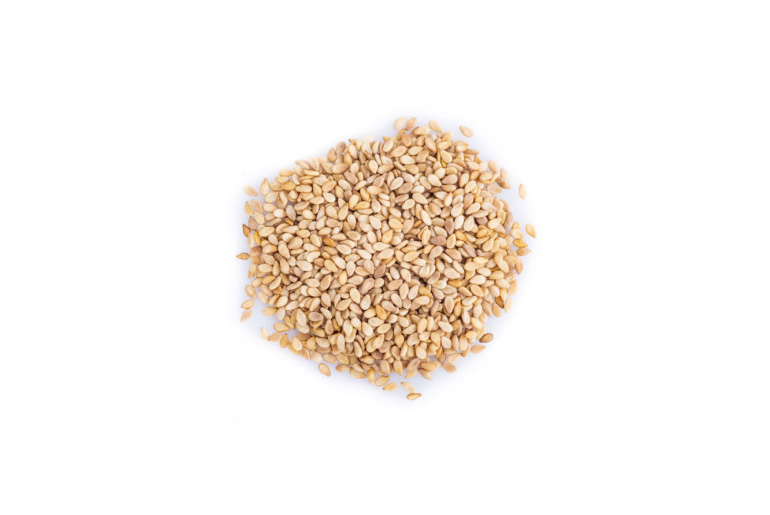Sesame seeds are beneficial for managing high cholesterol levels due to their rich content of lignans, phytosterols, and healthy fats, particularly polyunsaturated and monounsaturated fats. These compounds help reduce LDL (bad) cholesterol while maintaining or even boosting HDL (good) cholesterol. Phytosterols, in particular, mimic cholesterol in the body, leading to a reduction in its absorption, while antioxidants like sesamin and sesamol help protect the cardiovascular system from oxidative stress. Regular consumption of sesame seeds, whether whole or as sesame oil, can be an effective addition to a heart-healthy diet aimed at lowering cholesterol.
White sesame seeds are packed with nutrients and bioactive compounds that make them beneficial for managing high cholesterol levels. Here’s a detailed look at how they can help:
1. Rich in Healthy Fats
- How it helps: White sesame seeds are high in healthy fats, especially polyunsaturated and monounsaturated fatty acids. These fats can help reduce LDL (bad) cholesterol levels and increase HDL (good) cholesterol, contributing to improved heart health.
- Benefit: Lower LDL cholesterol and improve overall cholesterol profile.
2. Sesamin and Sesamolin (Lignans)
- How it helps: Sesame seeds contain lignans, particularly sesamin and sesamolin, which have been shown to lower cholesterol levels by inhibiting its absorption in the intestines and promoting its breakdown in the liver.
- Benefit: Reduction in total cholesterol and LDL cholesterol.
3. High in Phytosterols
- How it helps: White sesame seeds are a rich source of phytosterols, plant-based compounds that structurally resemble cholesterol. Phytosterols compete with dietary cholesterol for absorption in the digestive system, reducing the amount of cholesterol that enters the bloodstream.
- Benefit: Helps block the absorption of cholesterol, leading to lower LDL levels.
4. Antioxidant Properties
- How it helps: Sesame seeds contain antioxidants like sesamol and tocopherol (a form of Vitamin E), which help prevent the oxidation of LDL cholesterol. Oxidized LDL is more likely to form plaques in the arteries, leading to atherosclerosis.
- Benefit: Prevents plaque buildup in arteries, promoting heart health.
5. Rich Source of Fiber
- How it helps: The dietary fiber in white sesame seeds aids in reducing cholesterol levels by binding with cholesterol in the digestive tract and promoting its excretion.
- Benefit: Promotes the elimination of excess cholesterol, lowering total cholesterol levels.
6. Boosts Liver Function
- How it helps: Sesame seeds support liver health by enhancing the liver’s ability to process and remove cholesterol from the bloodstream, thereby lowering cholesterol levels.
- Benefit: Improves the body’s ability to regulate cholesterol and lipid levels.
7. Magnesium and Calcium Content
- How it helps: These minerals, found in high amounts in white sesame seeds, help regulate blood pressure and support heart health, indirectly reducing the risk of cholesterol-related heart disease.
- Benefit: Supports heart function and helps manage cholesterol levels by promoting healthy blood pressure.
8. Anti-Inflammatory Effects
- How it helps: Chronic inflammation is linked to high cholesterol levels and heart disease. Sesame seeds possess anti-inflammatory properties, which may help reduce inflammation in blood vessels and improve heart health.
- Benefit: Reduces the risk of cholesterol-induced arterial inflammation and plaque formation.
9. Source of Plant Protein
- How it helps: White sesame seeds are an excellent plant-based source of protein, which can help replace high-cholesterol, animal-based proteins in the diet.
- Benefit: A healthier protein alternative that helps in lowering cholesterol intake from animal sources.
10. Balances Lipid Metabolism
- How it helps: The bioactive compounds in sesame seeds help in regulating lipid metabolism, which involves breaking down fats and lipids in the body, contributing to cholesterol reduction.
- Benefit: Helps maintain a healthy balance of fats in the body, contributing to improved cholesterol management.
Incorporating white sesame seeds into your diet, either by sprinkling them on dishes or using sesame oil, can be an effective way to help manage high cholesterol levels. Their rich content of healthy fats, lignans, fiber, and antioxidants makes them a heart-friendly addition to any diet. However, it’s important to pair them with a balanced diet and regular exercise for optimal cholesterol management.
Disclaimer:
The information contained in this article is for educational and informational purposes only and is not intended as a health advice. We would ask you to consult a qualified professional or medical expert to gain additional knowledge before you choose to consume any product or perform any exercise.







